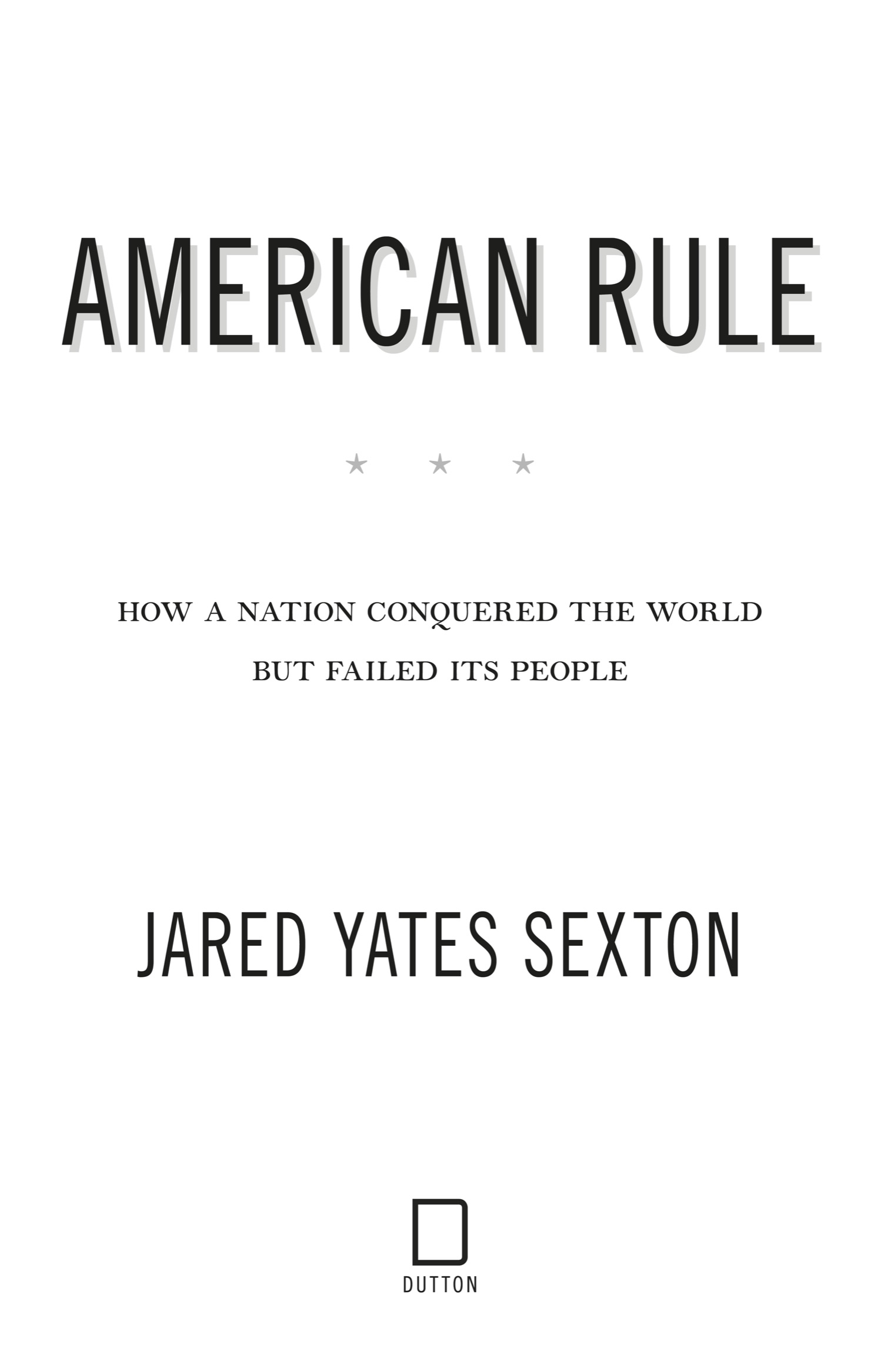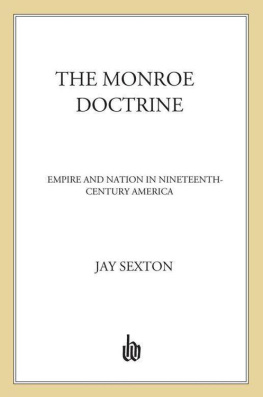Jared Yates Sexton - How a Nation Conquered the World but Failed Its People
Here you can read online Jared Yates Sexton - How a Nation Conquered the World but Failed Its People full text of the book (entire story) in english for free. Download pdf and epub, get meaning, cover and reviews about this ebook. year: 2020, genre: Politics. Description of the work, (preface) as well as reviews are available. Best literature library LitArk.com created for fans of good reading and offers a wide selection of genres:
Romance novel
Science fiction
Adventure
Detective
Science
History
Home and family
Prose
Art
Politics
Computer
Non-fiction
Religion
Business
Children
Humor
Choose a favorite category and find really read worthwhile books. Enjoy immersion in the world of imagination, feel the emotions of the characters or learn something new for yourself, make an fascinating discovery.
- Book:How a Nation Conquered the World but Failed Its People
- Author:
- Genre:
- Year:2020
- Rating:5 / 5
- Favourites:Add to favourites
- Your mark:
- 100
- 1
- 2
- 3
- 4
- 5
How a Nation Conquered the World but Failed Its People: summary, description and annotation
We offer to read an annotation, description, summary or preface (depends on what the author of the book "How a Nation Conquered the World but Failed Its People" wrote himself). If you haven't found the necessary information about the book — write in the comments, we will try to find it.
How a Nation Conquered the World but Failed Its People — read online for free the complete book (whole text) full work
Below is the text of the book, divided by pages. System saving the place of the last page read, allows you to conveniently read the book "How a Nation Conquered the World but Failed Its People" online for free, without having to search again every time where you left off. Put a bookmark, and you can go to the page where you finished reading at any time.
Font size:
Interval:
Bookmark:



DUTTON
An imprint of Penguin Random House LLC
penguinrandomhouse.com

Copyright 2020 by Jared Yates Sexton
Penguin supports copyright. Copyright fuels creativity, encourages diverse voices, promotes free speech, and creates a vibrant culture. Thank you for buying an authorized edition of this book and for complying with copyright laws by not reproducing, scanning, or distributing any part of it in any form without permission. You are supporting writers and allowing Penguin to continue to publish books for every reader.
DUTTON and the D colophon are registered trademarks of Penguin Random House LLC.
LIBRARY OF CONGRESS CATALOGING- IN-PUBLICATION DATA
Names: Sexton, Jared, author.
Title: American rule: how a nation conquered the world but failed its people / Jared Yates Sexton.
Description: New York: Dutton, An imprint of Penguin Random House LLC, [2020] | Includes bibliographical references and index. | Identifiers: LCCN 2020005155 (print) | LCCN 2020005156 (ebook) | ISBN 9781524745714 (hardcover) | ISBN 9781524745721 (ebook)
Subjects: LCSH: United StatesPolitics and government.
Classification: LCC JK275 .S49 2020 (print) | LCC JK275 (ebook) | DDC 973dc23
LC record available at https://lccn.loc.gov/2020005155
LC ebook record available at https://lccn.loc.gov/2020005156
While the author has made every effort to provide accurate telephone numbers, internet addresses, and other contact information at the time of publication, neither the publisher nor the author assumes any responsibility for errors or for changes that occur after publication. Further, the publisher does not have any control over and does not assume any responsibility for author or third-party websites or their content.
pid_prh_5.6.0_c0_r0
This book is for Norman Rexford Burk
It is well that we keep in mind the fact that not all of American history is recorded. And in some ways we are fortunate that it isnt, for if it were, we might become so chagrined by the discrepancies which exist between our democratic ideals and our social reality that wed soon lose heart. Perhaps this is why we possess two basic versions of American history: one which is written and as neatly stylized as ancient myth, and the other unwritten and as chaotic and full of contradictions, changes of pace, and surprises as life itself.
RALPH ELLISON , Going to the Territory, 1986
On the first anniversary of the disastrous election of 2016, I drove a few hours to a discussion about my recent book chronicling the rise of Donald Trumps movement, The People Are Going to Rise Like the Waters Upon Your Shore: A Story of American Rage. It was a cold and rainy night, and the audience came dressed for warmth and armed with questions about the sorry state of political affairs. Like most Americans, they were starving for hope. Already they were dismayed by Trumps cruel presidency and questioning whether the America they had known and loved would ever return. I did my best to give cogent, interesting answers, grabbed a coffee for the road, and braved the drizzle to find my car.
As I was about to step into the shimmering street, a hand landed on my shoulder. I jumped. Id been getting death threats for months. People had shown up at my house in the middle of the night, and hardly a day passed where I didnt receive an odd, fascist message detailing murderous fantasies. When I spun around, I half expected to find a jackbooted neo-Nazi thug looking to make good on those threats. Instead, it was a kind-faced middle-aged woman I recognized from the crowd.
Im sorry to bother you, she said, but I had a question. Something I didnt want to ask in front of anyone else.
Sure, I said, gripping my to-go coffee for the heat.
I have to ask... is this the end of America?
Since lighting off on the campaign trail in 2015 and watching Trump form a movement girded by white identity politics and despotic rhetoric, a movement unburdened by shame or the onus of truth, Id been wondering the same thing. It was an anxiety I never wanted to give voice to lest I gift it weight. A man like Donald Trump winning the presidency meant that something was very, very wrong with the United States of America.
Before I could answer, the woman asked another question: How did we get here?
This one I had covered. Id been answering it at every book tour stop and in every interview. I rattled off something about the radicalization of the Republican Party, the effects of polarization, the medias insatiable desire to turn politics into entertainment, the corrosive influence of new technologies, and the betrayal of the American people by a government bought and sold. It all came out in a practiced stream that sounded rehearsed and performed.
The stranger winced. Yeah, she reluctantly agreed, that makes sense, but how did all that happen? How did we get here?
I wrestled with that on my long drive home. For the most part, I could trace the explanation through Richard Nixon, the civil rights movement and social revolutions of the 1960s and 1970s, and the struggle of the Cold War. But as I continued to think about it, that story devolved into simplistic parody. Over the course of those hours on the road, I realized that while I had a working understanding of American history that Id gleaned through the years, I lacked a deeper grasp. The history I understood was the history featured in television shows, popular movies, textbooks that meant to guide students with as few bumps along the way as possible.
The past year had proven that this history didnt work anymore. When Trumps victory was added at the end as yet another twist, the narrative Id subscribed to lost all sense and meaning. The arc of time that Id heard spoken about so eloquently fractured under the weight. I could explain Trumps victory politically, demographically, and socially, but historically, I was at a loss.
By the time I pulled into my driveway in Georgia the next day, I had resolved to overcome my ignorance and relearn history from the very beginning. I had learned dates and surface-level details about the most important events, amassed an extensive repertoire of facts about wars and leading figures, but was lacking in a coherent and comprehensive understanding. What I knew was a privileged version of history that had been crafted to showcase America as the moral protagonist of a larger narrativeand now that narrative had all but collapsed.
I knew American history but needed to learn the history of America.
I grew up in a rural Indiana community in a poor family of factory workers and laborers. Coming of age in the 1980s, I was surrounded by all the pageantry of idyllic America. Every Fourth of July a giant parade flowed through the center of my sleepy town. My neighbors waved bright American flags as bands played The Stars and Stripes Forever and God Bless America. In school I was taught that an exceptional country founded by revolutionary fathers conquered a continent, overcame its vices in a terrible civil war, and then healed to spread its message of freedom and liberty to every corner of the globe. My family was impoverished, dysfunctional, abusive, but at least Id been lucky enough to be born in the United States of America, a divine blessing repeated by my elders and teachers and stressed by my preacher every Sunday morning as he pounded his pulpit.
Font size:
Interval:
Bookmark:
Similar books «How a Nation Conquered the World but Failed Its People»
Look at similar books to How a Nation Conquered the World but Failed Its People. We have selected literature similar in name and meaning in the hope of providing readers with more options to find new, interesting, not yet read works.
Discussion, reviews of the book How a Nation Conquered the World but Failed Its People and just readers' own opinions. Leave your comments, write what you think about the work, its meaning or the main characters. Specify what exactly you liked and what you didn't like, and why you think so.










